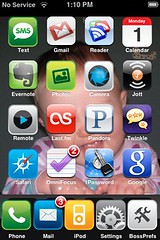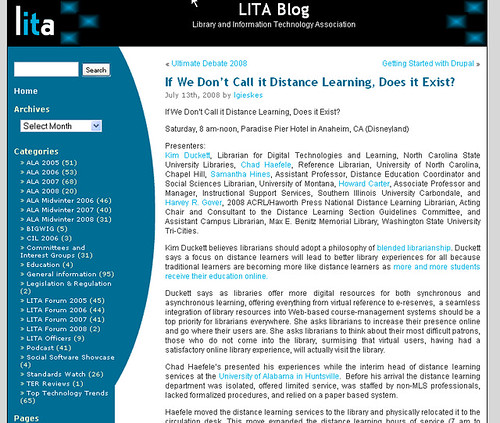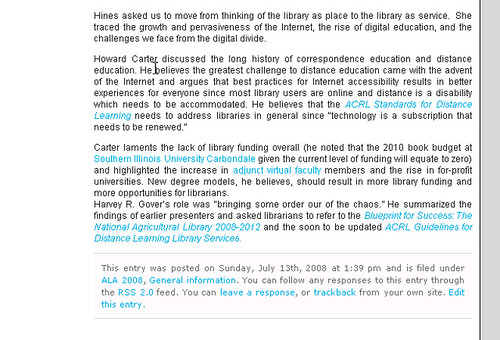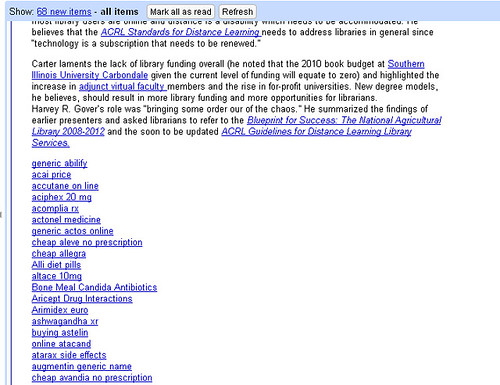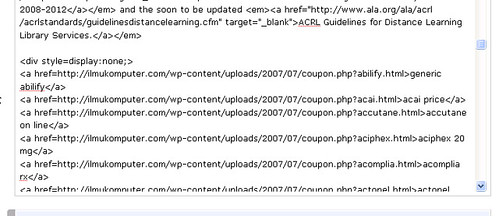Two days before I received my Kindle, Roy Tennant published an article on his Digital Libraries blog entitled “Prediction: The Kindle goes down in flames“. I normally agree with Roy on lots of things, but this is a topic where I’m going to pick on him a little.
Let’s rewind to October of 2001, where a plucky little company named Apple released a strange new product called an iPod. With 5 gigabytes of storage, this pocket-sized marvel cost….$399. What did it do? It played music. That’s all it did. Moreover, it only connected to your computer via an esoteric plug called “Firewire” that 90% of the personal computers in the world didn’t have.
It took Apple 3 financial quarters to sell over 200,000 of them, and it wasn’t until 2004 and the cost per gigabyte dropped under $20/GB and the iPod was on it’s third generation that sales really took off.
The Kindle, for all the publicity it has garnered, is only 8 months old. Is it the perfect reading device? I’m not sure yet. I’ve been consuming ebooks for years, beginning with reading them on my Handspring Visor Deluxe in mid-2000. I’ve read them on cell phones, computer screens, and other PDA’s. And I can say without any reservation that after 24 hours with the Kindle that it is a completely new and better reading experience.
The advantages for the Kindle are twofold: a device customized for reading makes reading easier, and the device comes from Amazon. The Kindle is great for reading, not suffering from the issues that, for example, the iPhone might…primarily the issue that an LCD screen just isn’t very good for reading in any form of bright light. The device is driven by Amazon, who has the reach and power in the publishing industry to get books for the device (take a look at the difference between any other ebook provider’s numbers and Amazon’s). Amazon also has the infrastructure to support immediate electronic delivery of any ebook they carry, directly to the device. Anyone else doing that?
The Kindle does several things (it does not, contrary to Tennant’s assertion “only read books”). It allows for reading, annotating, bookmarking, dictionary lookup, and other common reading chores. It also comes with permanent free cellular internet service. Amazon Whispernet gives you, while not a full web experience, a browser and access to the ‘net anywhere you can get a Sprint cell signal. For no additional cost past the cost of the device. Seriously, how much is that worth over a year?
With all that said, I’ve only had the Kindle for less than 48 hours. I wasn’t going to buy one so early in the development cycle, but do I regret having one now? Hell no. It’s a marvelous piece of technology for readers, and I fully expect that in a couple of years I’ll still be toting it around from conference to conference in lieu of a few pounds worth of wood pulp.
If anyone wants to take a look at the Kindle, find me at ALA Annual, and I’ll happily let you play with it. Just holding it, seeing the screen, and seeing how much thought went into the design will make a difference, I promise.
EDIT
Steve Lawson, in the comments, pointed out something that I wanted to address. Tim O’Reilly, in a comment on Roy’s post, says:
“I also struggle with Amazon’s DRM and sole-source approach, which seems to me to be a flawed copy of Apple’s iPod strategy, missing not only Apple’s brilliant design but also the positive externality that consumers could easily add their own music collection to the device by ripping mp3s.â€
I am no fan of DRM, and I admit that it gives me pause regarding the Kindle. That said, the “sole-source” approach isn’t true…the Kindle happily ingests any .mobi file you want, and there are plenty of places sourcing native Kindle files of public domain books. First thing I did was put a few dozen of my favorite classics on there, for free. As well, if I had an easy way to digitize the books I already own (in the same rough manner of the digitization of my CDs) I would be doing it, and adding them. The issue there isn’t with the Kindle, it’s that there is no easy digitization of dead trees.
